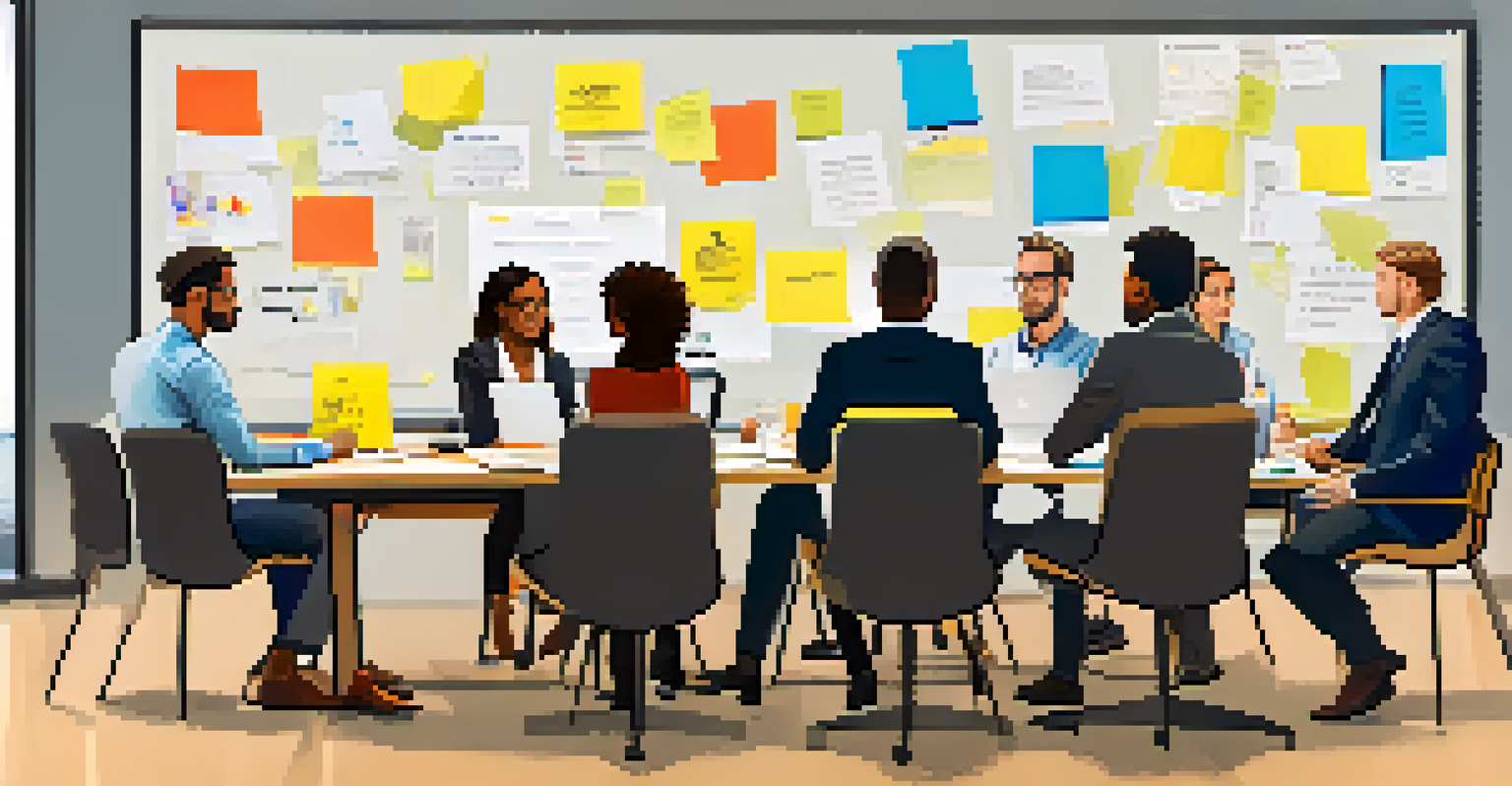The Role of Critical Thinking in Effective Problem Solving

Understanding Critical Thinking and Its Importance
Critical thinking is the ability to analyze information objectively and evaluate it effectively. It's essential in a world filled with information overload, helping us sift through data and identify what's relevant. By honing our critical thinking skills, we can approach problems more systematically and make informed decisions.
The ability to think critically is essential for making sound decisions in an increasingly complex world.
Imagine critical thinking as a flashlight in a dark room; it illuminates the path ahead, allowing us to see potential obstacles and opportunities. This process encourages curiosity and skepticism, pushing us to question assumptions rather than simply accepting them. Ultimately, this leads to better problem-solving outcomes and more innovative solutions.
In today’s fast-paced environment, critical thinking is not just a valuable skill; it's a necessity. Organizations that foster critical thinking among their teams often outperform their competitors by making smarter, quicker decisions. Thus, understanding its importance sets the stage for effective problem-solving.
The Connection Between Critical Thinking and Problem Solving
Critical thinking and problem-solving go hand in hand, like two sides of the same coin. When faced with a challenge, critical thinking allows us to dissect the problem, identifying its root causes rather than just addressing symptoms. This deeper understanding is crucial for developing effective and sustainable solutions.

For example, consider a company facing declining sales. Instead of merely increasing advertising, critical thinkers would analyze market trends, customer feedback, and competitor strategies. This thorough analysis leads to targeted actions that are more likely to yield positive results, demonstrating how critical thinking enhances problem-solving efficacy.
Critical Thinking Fuels Decision-Making
By analyzing information objectively, critical thinking helps individuals make informed decisions in complex situations.
Moreover, by fostering a culture of critical thinking, teams can collaborate more effectively. Diverse perspectives enrich the problem-solving process, encouraging innovative ideas that might not arise in a less critical environment. This synergy is key to overcoming complex challenges.
Techniques to Cultivate Critical Thinking Skills
Cultivating critical thinking skills requires intention and practice. One effective technique is questioning assumptions—whether they’re your own or those of others. By challenging the status quo, you open the door to fresh ideas and solutions that might be overlooked.
Critical thinking is the key to unlocking your potential and achieving your goals.
Another helpful practice is engaging in reflective thinking. After solving a problem, take time to reflect on the process. What worked? What didn’t? This self-assessment enhances your ability to think critically in future situations, making you a more adept problem solver.
Additionally, seeking feedback from peers can sharpen your critical thinking. Constructive criticism provides new insights and helps you identify blind spots in your reasoning. This collaborative approach not only improves your skills but also fosters a supportive learning environment.
Real-Life Applications of Critical Thinking in Problem Solving
Critical thinking is not confined to the classroom; it has real-world applications across various industries. For instance, in healthcare, professionals use critical thinking to diagnose patients accurately by analyzing symptoms and medical histories. This careful evaluation can be the difference between a correct diagnosis and a potentially dangerous oversight.
In the business world, leaders often rely on critical thinking to navigate complex challenges. For example, during a crisis, a company’s ability to assess risks and devise strategic responses can determine its survival. By applying critical thinking, leaders can make decisions that not only address immediate issues but also position the company for long-term success.
Overcoming Barriers Enhances Skills
Addressing cognitive biases and fostering an open environment can significantly improve critical thinking and problem-solving abilities.
Similarly, educators apply critical thinking to develop curricula that encourage students to think independently. By fostering an environment where students analyze and question information, they prepare future generations to tackle problems creatively and effectively.
Barriers to Critical Thinking in Problem Solving
Despite its importance, several barriers can hinder critical thinking. One major obstacle is cognitive biases—systematic patterns of deviation from norm or rationality in judgment. These biases can lead individuals to make decisions based on emotions rather than facts, compromising their problem-solving abilities.
Another barrier is a lack of time. In fast-paced environments, the pressure to make quick decisions can stifle critical thinking. When urgency takes precedence over thorough analysis, solutions may be less effective and potentially lead to further problems down the line.
Additionally, a culture that discourages questioning or dissent can inhibit critical thinking. If team members feel they cannot voice their opinions or challenge ideas, the collaborative problem-solving process suffers. Creating an open environment where diverse thoughts are welcomed is crucial for overcoming these barriers.
The Benefits of Emphasizing Critical Thinking
Emphasizing critical thinking in problem solving offers numerous benefits. First and foremost, it leads to better decision-making. When individuals take the time to analyze situations thoughtfully, they are more likely to arrive at solutions that are effective and well-reasoned.
Furthermore, fostering critical thinking encourages creativity and innovation. When people feel empowered to explore new ideas and question established norms, they are more likely to come up with inventive solutions to complex problems. This creative energy can be a game-changer in any organization.
Real-World Impact of Critical Thinking
Critical thinking plays a vital role across various industries, aiding in accurate diagnoses in healthcare and strategic decision-making in business.
Lastly, prioritizing critical thinking develops resilience. In a world that constantly changes, being able to adapt and think critically about new challenges equips individuals and teams to navigate uncertainties effectively. This level of preparedness not only enhances problem-solving skills but also builds confidence.
Conclusion: The Indispensable Role of Critical Thinking
In conclusion, critical thinking is an indispensable skill in effective problem solving. It empowers individuals to approach challenges with a clear, analytical mind, leading to informed decisions. As we've explored, the interplay between critical thinking and problem-solving is vital for success in various fields.
By actively cultivating critical thinking skills and addressing barriers, we can enhance our ability to solve problems creatively and efficiently. This journey involves continuous learning and a commitment to questioning our assumptions, ultimately leading to better outcomes.

As we navigate an increasingly complex world, honing our critical thinking abilities will not only benefit us individually but also contribute to the success of our teams and organizations. Embrace critical thinking as a core skill, and watch your problem-solving capabilities flourish.